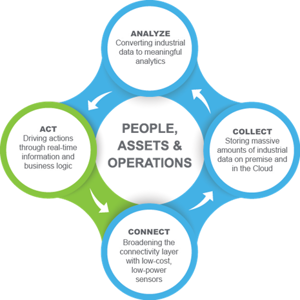Strategic Implementation of IIoT in Refineries
The industrial Internet of things (IIoT)—the growing network of devices that connect, communicate, and transfer data between one another—is poised to play a growing role in how refineries operate. Due to the falling cost of connectivity and data storage, processes across the entire Oil & Gas value chain are now able to gather more data from more devices, assets, operations, and processes than ever before. However, refining (downstream) in particular, stands to gain value quickly because the existing IT infrastructure is more mature compared to extraction (upstream) and distribution (midstream) processes.
A significant part of the IoT infrastructure in Refining is mature
Many of the products and services that enable the
The challenge isn’t getting data. Rather, it is about gaining insight – in real time.
Here again, downstream processes are far more instrumented and connected relative to their counterparts in upstream and midstream. Therefore, refining’s typical dilemma is one of “drowning in data but starving for insight.” The lack of insight means the business case can quickly be built on leveraging data that is already being captured to provide actionable intelligence promptly.
The transition to an IIoT-centric architecture still has gaps
Realigning both existing investments and new technological advances within the framework of an IoT architecture is still being developed. Major areas identified as gaps include:
- Security: From a risk perspective, this naturally continues to be the biggest hurdle to
IIoT adoption. - Lifecycle management & governance: A Refinery information management system involves integrating (at least) 15 application areas (often from multiple vendors.) Thus, the IIoT strategy also needs to address reducing lifecycle costs in adapting and maintaining this large IT footprint.
A framework to help to maximize business value from IoT
Given the strategic role of IIoT in reshaping the computing landscape, there have been some design frameworks and reference architectures introduced over the last few years.
The foundation of this operational perspective starts with the basic principle of the closed-loop process. The four stages of AVEVA’s framework can be applied narrowly (to a specific IIoT use case), or broadly (to define a platform strategy) that guides the architecture of an integrated refinery information management system that enables:
- Connecting to mass quantities of disparate hardware assets
- Collecting and reconciling massive volumes of diverse unstructured data
- Contextualizing and analyzing that data into actionable information
- Closing the loop on the information provided with actions that deliver operational benefits.
Simply stated, IIoT as a concept is about big data generated from connected devices or
assets (often monitored by operators) to make smarter decisions. Alignment and integration
of business and operational metrics help create the context for smarter decision making in
a timely manner to improve business goals such as profitability and regulatory compliance.
Thus, the broad outlines of a business case for IIoT in Refining are built around synchronizing
leading and lagging indicators, as close to real-time as possible. IoT is an initiative that goes beyond a technology-centric view, to define a new way of working, via new worker profiles that enable real-time visibility and situational awareness.
Read More: Start your journey with AVEVA today







Comments